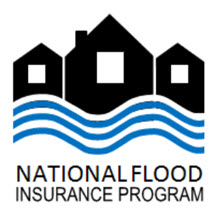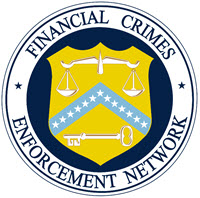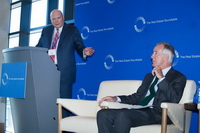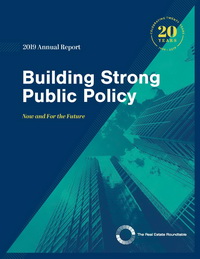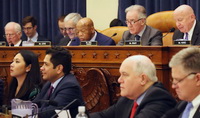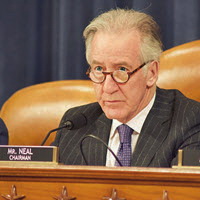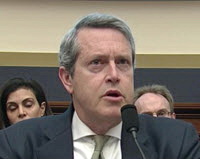A hearing on The Reauthorization of the Terrorism Risk Insurance Program before the Senate Banking Committee was held on June 18 as the Coalition to Insure Against Terrorism (CIAT) – including The Real Estate Roundtable – submitted comments urging Congress to pass a long-term reauthorization of the Terrorism Risk Insurance Act (TRIA).
 |
|
CIAT’s comment letter to Chairman Mike Crapo (R-ID), above, and Ranking Member Sherrod Brown (D-OH) urges prompt congressional action for a long-term reauthorization of this critical program. |
- CIAT’s comment letter to Chairman Mike Crapo (R-ID) and Ranking Member Sherrod Brown (D-OH) urges prompt congressional action for a long-term reauthorization of this critical program. The letter states, “At almost no cost to the taxpayer, the Program has been the key factor in ensuring that the private insurance market has remained intact and continues to meet the needs of commercial policyholders during the on-going threat of a future terrorist attack – all while minimizing federal taxpayer exposure.”
- Senate Banking Committee Chairman Michael Crapo (R-ID) discussed reauthorization of the Terrorism Risk Insurance Program Reauthorization Act of 2015 (TRIPRA) at The Roundtable’s Spring Meeting in April. (Roundtable Weekly, April 12). The Committee’s Ranking Member, Sen. Sherrod Brown (D-MA), acknowledged the need to extend TRIA before its expiration at The Roundtable’s Annual Meeting on June 11 in Washington. (Roundtable Weekly, June 14)
- Testifying before the committee, Marsh’s property terrorism placement and advisory leader Tarique Nageer noted that the expiration of TRIPRA without a replacement could create capacity shortfalls, especially for firms with “significant workers’ compensation accumulations.
- Nageer stated, “We are already seeing an impact on policies that extend beyond 2020, with some insurers either seemingly unwilling to offer terrorism coverage beyond the expiration of TRIPRA or seeking to increase prices to cover the additional risk to their portfolios. Without a decision to reauthorize or extend TRIPRA, we expect to see more sunset provisions in policies and higher costs as we get closer to December 31, 2020.” (Nageer’s testimony, June 18)

- Chairman Crapo stated that he anticipates additional “balanced reforms” to TRIA that “reduce taxpayer exposure” without substantially increasing costs or decreasing take-up rates. His focus was on what changes are necessary based on data, not whether the program is needed. Only two Republicans attended the hearing, whereas the Democrats in attendance voiced unified support of TRIA. (Senate Banking Committee hearing video, statements and testimony)
- Chairman Crapo and Sen. Brown agreed that it was important that reauthorization take place sooner rather than later to ensure a lapse in coverage does not happen again. Sen. Menendez (D-NJ) noted during the hearing that a lapse in 2014 created uncertainty, resulted in sunset clauses on policies, and increased costs on long-term construction deals. A similar situation could begin as early as January 1, 2020.
- Additional hearings on TRIA are expected that would include policyholder and insurer witnesses and could address issues such as the length of another reauthorization and the scope of TRIA regarding cyber, nuclear, biological, chemical, and radiological risks.
A long-term authorization of TRIA continues to be a top policy priority of The Real Estate Roundtable. (Capital and Credit sections of The Roundtable’s 2019 Policy Agenda and FY2019 Annual Report)
Other Resources:
- A summary by theInsurance Journal about the Marsh report, “What Might Happen If Conress Fails to Renew Terrorism Reinsurance Program”
- Congressional Research Service (CRS) report on TRIA
- Edward Zonenberg, Senior Financial Analyst with AM Best discusses mitigation planning in the event of a possible lapse or shutdown of TRIA
# # #


